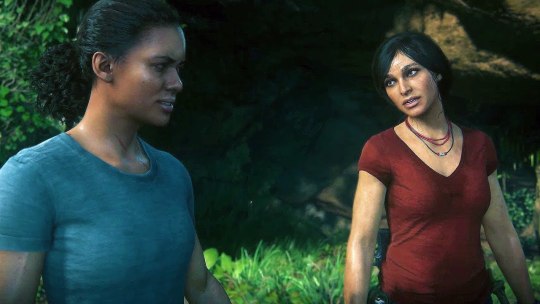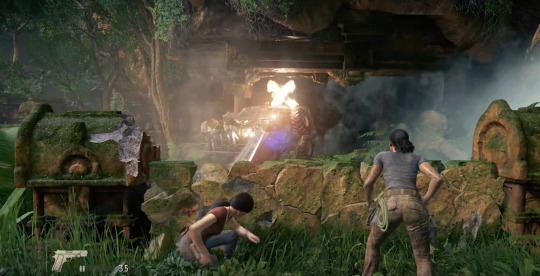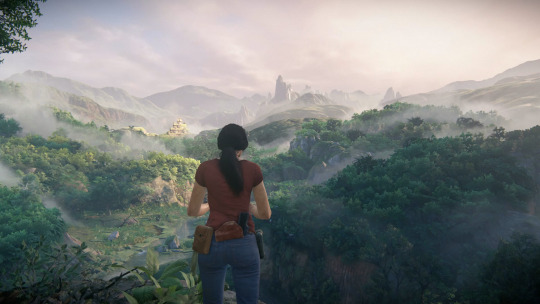#actually all the female side characters in those dlcs were so much more compelling and interesting than daud
Explore tagged Tumblr posts
Text
@theflamingmarshmallow I'm way too tired to reblog and respond to that whole thing and I get that daud is your ickle old angst man fav, and lots of folks feel that way. That's why daud gets the redemption arc and Delilah is the scary lesbian-coded villain
The makers of the game made it so the grizzled old white man who murdered an empress and kidnapped a ten year old and then framed her dad gets ~*forgiveness*~ but the damaged lesbian-coded androgynous woman has no remorse because she's just plain "evil" (fuck, at least she has convictions lmao. Daud just does whatever for money)
Like... the characters aren't real, they were created that way.
Lastly, my main point was talking about Delilah's treatment by the creators, not Daud's man feelings
#dishonored#delilah#i hate daud lmao#i hated playing him in the dlcs#i dont care about his man feelings#i just wanted to hang with billie and lizzie and see the cool witches#actually all the female side characters in those dlcs were so much more compelling and interesting than daud#fuck i wanna play as lizzie stride LMAO#thank god we got to play as billie later
8 notes
·
View notes
Text
Diminishing returns are hard to notice in a game as good as Uncharted: The Lost Legacy

We’re now ten years removed from the year Naughty Dog released Uncharted: Drake’s Fortune, the first game in what would become a defining series for the previous console generation, and eight years removed from Uncharted 2: Among Thieves, the game that blew the collective mind of action game fans everywhere and cemented many of the narrative and gameplay elements that would dictate a whole genre then until now. You’d imagine that by now, a team as talented and innovative as Naughty Dog would have moved on to something completely new, as they seemed to suggest they were doing in 2013 with The Last of Us, one of my favorite games of all time, or that if they were still somehow making Uncharted games in 2017, that they would have lost all the luster the series once held. The fact that neither of those things is true, and that, in fact, the most recent two games in the series, released within nearly a year of each other, are hands down the best games the series has to offer, is something I’m still struggling to fully wrap my head around.
Uncharted 4 was by all rights an unnecessary game, a next-gen follow up that didn’t particularly feel mechanically removed from the ones before it, the third of which started to wear thin before it was even over. And yet, the incremental but significant improvements the game made - fully taking advantage of the stunning capabilities of the PS4’s hardware, adding stealth mechanics that allowed for variation and choice in gameplay, and, most importantly, integrating the lessons learned from The Last of Us to tell one of the most compelling and mature stories ever told in a video game - made Uncharted 4 one of the premier gaming experiences of the current generation. The newest game in the series, The Lost Legacy, was originally meant to be the DLC to Uncharted 4, but seemingly gained a life of its own in the production process, so much so that it turned into a full-length, stand-alone title, which is available at the really rather generous price of $40, or, free to those who bought the Season Pass to the previous game.

From the start, the most obvious change this game offers is that Nathan Drake, the dashingly manipulative protagonist of every previous game, is nowhere to be found, and in his place is Uncharted 2’s not-quite-femme-fatale Chloe Frazer, joined by Uncharted 4’s not-quite-villain Nadine Ross. If Uncharted 4 was the game to poke holes in Drake’s problematic charisma, The Lost Legacy is the game to finally retire him for good, making room for a couple of the series’ female characters, long relegated to the sidelines despite their well-rounded development, to truly shine in the leading role. The peak-of-the-medium storytelling Naughty Dog has made their signature for the last four years or so is as soulful and inspired as it’s ever been here, providing character depth and dynamics that are just about unparalleled in the industry: everything, from the directing to the acting to the writing, tied together by just about the most impressive use of motion capture in any video game, is wildly masterful to the point that it kind of just makes any other game aiming for similar fidelity nearly irrelevant.
As it turns out, the headstrong and sarcastic Chloe pretty easily fills any Drake-shaped holes the player may be tempted to see, but goes further than that, proving herself to have a compassionate and sincere soul underneath the quips and stubborn determination. The real magic of the story, regardless of the main plot, which expectedly involves a quest for lost artifact from some quasi-mythical forgotten city and a villain that’s trying to get to it first, is the relationship that builds between Chloe and Nadine. Nadine may have been on the opposite side of the Drake brothers in the previous game, but she always came across as a particularly level-headed mercenary hired by the true villain, and here we’re able to see her break down her stoic walls of professionalism as she becomes friends with her newest employer. The writing is strong, but just as before, the real MVP driving the story is the how beautifully the motion capture renders the performances. These characters can say so much without a single word through naturalistic facial expressions, and it’s not long into the game before one stops thinking of them as computer-rendered.

Like the last game, The Lost Legacy introduces a new element that serves to separate it from the rest of the games in the series: there’s actually an open world section. It only happens once, right in the middle. The first and last parts of the game unfold in the same linear fashion as every previous game does, but for the middle section, the player is given a large chunk of open land to drive around, replete with many of the defining traits of other open world games: you start by climbing a tower to get a lay for the land, and from there can tackle any of the story sequences in the order you wish; the area is also replete with enemy camps to raid and side item collecting that proves to be surprisingly quite compelling. Fully exploring this section can take a solid few hours, if you’re interested in more than just the main story, and I personally loved taking my time here.
The game remains rather mechanically simplistic here, and even the map is just an actual piece of paper one must pull out and look at in order to find one’s way and mark down new discoveries, so there’s a stripped down feeling of surveying to the whole sequence, allowing the series’ title to feel more relevant than ever. Plus, the more you explore, the more Chloe and Nadine chat, relegating some of the most insightful revelations about these characters to the absorbing sidelines. Given the relative minimalism of it all, I’m not sure how much I’d enjoy, say, a whole game based around it, but occurring where it does in a roughly ten hour game, it serves to break up the gameplay wonderfully.

As for the rest of the game: well, it’s Uncharted. As shockingly strong as this game is, there’s a certain impact that just isn’t going to hit anymore. The wall-scaling and the gunplay that have always made up the bulk of these games is still there, and with that comes the Unchartedness that once was surprising and thrilling, but now feels expected almost to the point of feeling rote. There’s only so many times a structure can crumble just as you jump off it before that sinking feeling in your gut just doesn’t happen anymore. Some of the big action set pieces feel a little like stale rehashes of moments from previous games, even if they’re technically done better than ever before. For those who still feel burnt out from the last game, the prospect of incremental gameplay improvements and another beautifully crafted story may not feel like enough to make any of the standard Uncharted stuff feel any less underwhelming.
But for those like myself, who find it impossible to resist a lovingly built Naughty Dog game, that occasional feeling of deja vu isn’t particularly difficult to overcome. It’s a consistently gorgeous game with unparalleled character work, and gets the job done a lot faster than the previous game, which, for many, despite its achievements, overstayed its welcome by the end. As far as I know, this is Naughty Dog’s final foray into the universe of Uncharted, but it's a testament to this game’s enduring playability that at the end of it, I walked away thinking that for as long as they continue making these, I feel confident I’d stay a happy customer, no matter how increasingly unnecessary they may feel.
8.2

2 notes
·
View notes